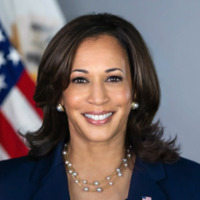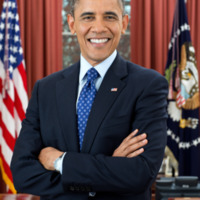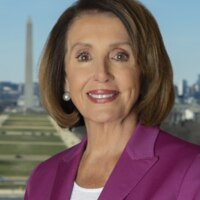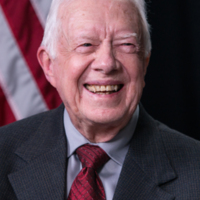Kamala Harris
Announcement of Candidacy
Kamala Harris, the 49th and current Vice President of the United States, announced her 2024 presidential campaign on July 21, 2024, following President Joe Biden's decision to withdraw his re-election bid and endorse her earlier that day.
Harris, a Democrat, gained national attention during her 2016 campaign for the U.S. Senate. She further elevated her profile during her 2020 presidential campaign, although she withdrew in 2019. Harris subsequently endorsed Joe Biden, who selected her as his running mate. Following their victory, she made history by becoming the first female Vice President of the United States in 2021.
Campaign Platform Focus Areas
Kamala Harris' domestic policy platform closely aligns with Biden's, advocating for national abortion rights, LGBT+ protections, and significant climate change legislation. Harris is also a strong proponent of environmental justice and comprehensive immigration reform. In foreign policy, she opposes the Russian invasion of Ukraine and has shown greater empathy towards Palestinians in the context of the Israel–Hamas conflict. Nonetheless, there is still uncertainty towards her complete stance in the Israeli-Hamas conflict, as some critique her lack of action towards protecting Palestine.
Key Endorsements
Following Biden's withdrawal and his endorsement of Kamala Harris, the Democratic Party swiftly unified behind her. A substantial majority of Congressional Democrats, including key figures such as Senate Democratic Leader Chuck Schumer and House Democratic Leader Hakeem Jeffries, voiced their support for Harris, whilst very Democratic governor endorsed her candidacy. Moreover, some key endorsements to mention include former Speaker Nancy Pelosi, former President Barack Obama and former First Lady Michelle Obama, and Jimmy Carter, the oldest living former Democratic president.
Vice Presidental Selection
As of July 29, 2024, Kamala Harris's shortlist for running mate included Andy Beshear, Mark Kelly, Josh Shapiro, and Tim Walz. Reports varied on the frontrunners: ABC News noted Kelly and Shapiro as leading candidates, while other sources mentioned Roy Cooper as a top choice. Financial Times highlighted Cooper, Kelly, and Shapiro as the frontrunners, with donor preferences leaning towards Cooper or Shapiro and "Hollywood Democrats" favoring Kelly.
The New York Times added Walz as a serious contender, and The Washington Post and MSNBC confirmed Cooper, Kelly, and Shapiro as the top three on Harris's list. However, Bloomberg News suggested Kelly, Shapiro, and Walz as the final three, while USA Today pointed out Beshear's prominence in the vetting process. CNBC reported Transportation Secretary Pete Buttigieg was also on the shortlist.
CNN, however, indicated Kelly, Shapiro, and Walz as top contenders, with Beshear and Buttigieg still in the conversation but not among the leading candidates. With all these options, Harris has not yet finalized her running mate, but will plan to campaign with them in battleground states the following week.
Campaign Marketing
"Brat-ification" of Kamala Harris
Harris's campaign has embraced the "brat" trend popularized by British pop star Charlie XCX, engaging Generation Z through memes and social media. The trend, popular among young people, emphasizes being unapologetically messy, honest, and a bit rebellious. Harris's campaign rebranded its online presence with elements of the "brat" aesthetic, including lime green visuals and a new social media strategy focused on engaging Gen Z. This approach aims to counteract disillusionment among young voters and present Harris as a relatable, youthful candidate. Harris' campaign launched an Instagram page, Kamala HQ, to capitalize on the trend.
Harris's supporters turned Republican attempts to mock her into memes that boosted her popularity, such as "operation coconut tree." High-profile endorsements from Democratic leaders and celebrities like Beyoncé and Katy Perry have further energized her campaign. Harris focuses on issues important to young voters, including climate action, voting rights, LGBTQ+ equality, gun control, economic justice, and abortion rights. Her outspoken stance on Israel's war in Gaza has also resonated with younger voters.
By leveraging this viral trend, the Harris campaign seeks to energize young voters and create a sense of cultural relevance, distinguishing her from older candidates and aligning with key Gen Z values and issues.
"Weird" Branding
According to Wikipedia, another aspect of Harris' campaign messaging has focused on branding Republicans and vice presidential nominee JD Vance as "weird" on multiple occasions. Specifically, it has been used to highlight unconventional or erratic behavior and comments from Trump and Vance, such as Vance's past statements on childless political leaders and Trump's various public remarks. During a campaign fundraiser in Pittsfield, Massachusetts, Harris said, "You may have noticed, Donald Trump has been resorting to some wild lies about my record. And some of what he and his running mate are saying, well, it's just plain weird. I mean that's the box you put that in."
Calling Donald Trump "weird" highlights the unusual behavior of Republicans. This rhetorical shift aims to inject humor and energy into her campaign. While Democrats embrace this new strategy, Republicans respond with personal attacks and criticisms of Harris's record. The tactic has garnered attention, showing its potential effectiveness in defining her opponent in a new way.
This strategy aims to resonate quickly with supporters, creating a narrative that is easily shareable and engaging on social media. It also frustrates opponents, leading them to amplify the message through their defensive reactions. The tactic contrasts with the more formal and serious messaging from previous campaigns, offering a fresh way to engage with voters, particularly younger demographics who respond well to meme culture and humorous takes on political issues.
Republicans for Kamala
Moreover, Harris's campaign also includes a new initiative called "Republicans for Harris," aimed at mobilizing Republicans who reject the chaos associated with Donald Trump. Olivia Troye, a former Homeland Security adviser to Vice President Mike Pence, is part of this group and endorses Harris, highlighting her compassionate and respectful approach to conservative views on issues like women's reproductive rights.
The campaign highlights Trump's support for far-right policies and projects, which they argue are toxic to traditional Republican values. They aim to present Harris as a unifying and competent leader who can restore integrity and stability to the presidency. This strategy has garnered attention and endorsements but its effectiveness remains to be fully seen as the election approaches
Campaign Analysis
Should Harris secure the Democratic Party's nomination for the 2024 presidential election, she would be the first Black woman and the first Asian American to achieve this milestone for a major political party. If elected, she would also be the first female and first Asian American President of the United States.
On July 22, Harris garnered enough delegate endorsements to become the presumptive Democratic presidential nominee. These endorsements, however, are non-binding until the party's formal vote, scheduled to take place from August 1 to August 5, according to Democratic officials.
Currently, Harris has expressed a strong desire to debate Donald Trump, showcasing her confidence in her positions and debating skills. She believes that confronting Trump directly will highlight her commitment to addressing key issues and defending democratic values, setting a clear contrast between her vision for the country and Trump's record.




